English
29.07.2025

ABRAMOVIĆ: NO ONE IS INVESTIGATING THE MURDER OF NEARLY 500 SERB CIVILIANS NEAR GLINA
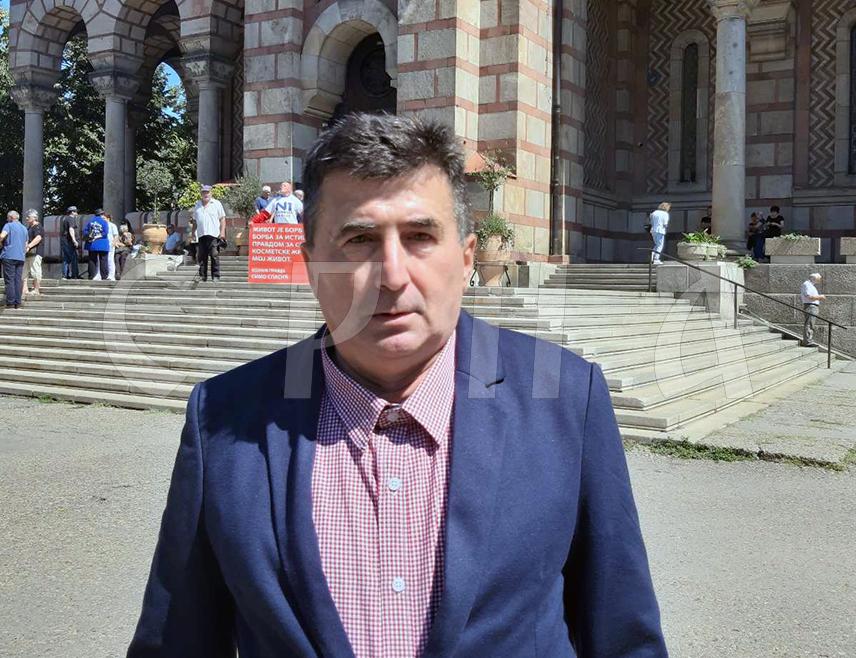
BELGRADE, July 29 /SRNA/ – Nenad Abramović, the Head of the Zavičaj Association of Displaced, Refugee and Settled Persons, said that as the 30th anniversary of the suffering of Serbs during the Croatian military-police Operation Storm approaches, the most painful truth for Krajina Serbs is that many crimes committed by Croatian forces remain beyond the reach of justice, emphasizing that the result was the exodus of over 250,000 ethnic Serbs.
Abramović particularly pointed out the massacre of approximately 500 Serb civilians at Janus Meadows near Glina, for which no investigation has ever been initiated, the unprosecuted killing of 10 civilians in Dvor na Uni, and the crimes committed by the 5th Corps of the Bosniak Army under the command of General Atif Dudaković. "It's sad that there is still no justice for the victims of these crimes, including the killings of Serbs on the Petrovac Road and in Svodna, for which trials only recently began in Belgrade. It's terrifying that the exact number of victims from all the crimes during ‘Storm’ will probably never be determined," Abramović told SRNA. He fled with his family from Banija in August 1995. ARMY FOLLOWED PEOPLE Abramović was on the front line in Petrinja when Operation Storm began, trying to hold off the superior Croatian forces with his comrades from the Krajina Serb Army. He recalls they resisted bravely, even capturing four Croatian tanks, but the Croatian offensive -supported by NATO - cut all communication lines, essentially leaving the Serb army headless. The Croatian command in the area was replaced due to high losses, yet the Serb defence was eventually breached near Slunj and Gradiška. "That's when the Serb civilians began fleeing. Once the people started to leave, the army followed. We were constantly being shelled. By the afternoon of August 4, a huge, unending refugee convoy was forming," Abramović said. People from Petrinja, Caprag, and Sunja crossed over at Kostajnica and Dvor na Uni, together with Kordun residents. They soon found themselves surrounded, with Dudaković’s 5th Corps joining the attacks. "Major crimes were committed between Glina and Dvor na Uni. Only thanks to the command of General Mile Novaković, who kept returning and managing to clear a path with tanks, were even greater casualties prevented. The heaviest civilian losses occurred at Janus Meadows and from Dvor toward Novi Grad, so the only escape routes were the bridges in Dvor na Uni and Kostajnica," Nenad explained. CIVILIANS EXECUTED IN AT LEAST TWO BUSES The worst atrocity, he emphasized, was committed at Janus Meadows near Glina, where the number of about 500 murdered Serbian civilians is mentioned. "The victims were civilians known to have been in at least two buses. Very little is known about this crime. It remains uninvestigated. One Croatian commander who was there and spoke about it mentioned the figure of 500 murdered civilians. Other individuals also pointed to horrific events that took place there. But not even an investigation has been launched, let alone prosecution," Nenad said. The situation in that area was extremely difficult, as the Croatian forces were assisted by the Bosniak 5th Corps, which cut off escape routes, and both Croatian and Bosniak forces were killing civilians, including mentally ill patients evacuated from the hospital in Petrinja. "Dvor na Uni was practically changing hands until all the people who could escape managed to cross. After that, the bridges were blown up, which didn’t stop the enemy. They chased us and launched rocket attacks. Near Svodna and on the Petrovac Road, the convoy was bombed from aircraft, which resulted in many victims there," Nenad recounted. SOME WERE DYING, OTHERS WERE BEING BORN IN CONVOY According to Abramović, the situation was also dire near Brčko, where the corridor was narrow, and the refugee convoy came under shelling there as well, meaning there was virtually no safe stretch of road until they reached Serbia. “In that refugee convoy, people were dying and being born. When someone died, they were buried near the place where they passed away; later their families would come back to exhume and re-bury them in the towns where they eventually settled. When we reached Serbia, we kissed the ground, but even then, there were problems getting in. At Rača, one man committed suicide because he couldn’t take it anymore psychologically,” Nenad recalled. Everything around him was horrific and traumatic, but what pained him most, he said, was the suffering of the elderly and small children, who had been traveling for days without hygiene or even basic necessities. "We had nothing. But we Krajina Serbs somehow didn't fully grasp what was happening or how hard it would be to start a new life. The people of Serbia welcomed us warmly, which cannot be said about the government at the time. They were forcing us to go to Kosovo and Metohija and didn't allow us into Belgrade, which for us Krajina Serbs back then was a forbidden city," Abramović recalled. ENTERING "FORBIDDEN CITY" BY TRACTOR Despite everything, he and his family managed to enter Belgrade on a tractor, reaching South Boulevard, where a police officer let them through, ending their six-day journey in an endless refugee convoy. His father drove the tractor as far as Svodna, after which Nenad took over the wheel when he joined them after arriving from Petrinja, and drove the family into Serbia via Šepak. He vividly remembers how the people of Mačva warmly welcomed them, bringing out whatever they had to help. "I will be grateful to them for as long as I live. My heart was full when I arrived in Serbia. Even though I slept in the tractor trailer, I could finally sleep peacefully," he emphasized. He says he became emotionally attached to the tractor that carried his now late mother, brother, and aunt to Serbia,. That same "machine" is still with him. He even drove it through Belgrade during one of the commemorations of Serb suffering in Operation Storm. "It turned out that the tractor was a machine of salvation for us, Krajina Serbs. If it hadn't been for the tractor, who knows what would have happened. They were preparing another Jasenovac for us, and it's a good thing we took up arms to defend ourselves and preserve our biological survival, to make it to our Serbia and be here with our people. It wasn't easy, but we made a home here and managed to build beautiful communities we are proud of," Nenad said. WHAT DOESN'T KILL YOU, MAKES YOU STRONGER He believes that Krajina Serbs are like the Phoenix, having risen from devastation and proven the old saying: "What doesn’t kill you, makes you stronger." "In a way, the exodus made us Krajina Serbs stronger. We became tougher people, and nothing can stop us. We won't let anyone walk over us or take away our Krajina pride, even though they took everything else," Nenad emphasized. However, he adds, those who expelled the Serbs and took everything from them failed to take the most important thing - their dignity. "And let the Croats know: what they took from us is not theirs! When something isn't yours, you must always be ready for the rightful owner to come and claim it. Maybe future generations will come one day to reclaim what belongs to us," Nenad declared. Until then, he says, Krajina Serbs must wage a legal battle for their property and insist on Annex G of the Vienna Agreement on Succession, in order to reclaim all their rights. "It is difficult, yes - but we must be persistent and, like parrots, keep repeating that what the Croats took is ours, which they must return it. We cannot bring the past back, but we will fight for the future, because that is Krajina land, which we will never give up on!" Avramović emphasized. CONSTANTLY POINT TO CRIMES AGAINST SERBS! He believes there are now also some positive developments, as the authorities in Republika Srpska have strengthened the culture of remembrance, so that now, along with the anniversary of the suffering during Operation Storm, there will also be commemorations for the expulsion of Serbs in the Croatian military Operation Flash. "We must constantly, in every possible way, draw attention to the crimes committed against our people. We must build memoriuals and teach our children history without the forgeries being pushed on us. Our Serbian Orthodox Church should mark the days of suffering in Operation Storm as red-letter days for its victims," Abramović said. He pointed out that Operation Storm remains a permanent warning, and that because of this, Serbs must turn toward unity, remain united, and defend their values, to ensure that such exoduses are never repeated. "We must stand together, because our enemies are just waiting for us to show weakness so they can strike again. That's why I call for unity - so that we never again see refugee convoys hundreds of kilometers long, full of cars, tractors, and horse-drawn wagons, like during the Operation Storm," Abramović concluded.
English

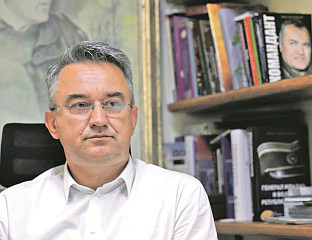
DARKO MLADIĆ: NEW RULES BEING ESTABLISHED FOR GENERAL MLADIĆ
BELGRADE, JULY 29 /SRNA/ - The decision of the International Residual Mechanism for Criminal Tribunals in The Hague to reject the request for early re...

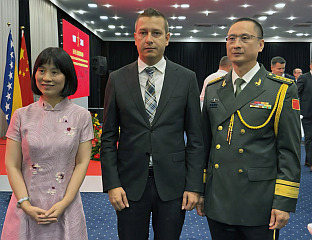
GOGANOVIĆ ATTENDS RECEPTION MARKING THE DAY OF THE CHINESE PEOPLE'S LIBERATION ARMY
SARAJEVO, JULY 29 /SRNA/ - Deputy Minister of Defense in the Council of Ministers, Aleksandar Goganović, attended a reception in Sarajevo marking the...


NOT A SINGLE DAY OF REPUBLIKA SRPSKA'S LIFE WAS EASY, BUT IT STANDS STRONG TODAY
BANJA LUKA, JULY 29 /SRNA/ - Republika Srpska President Milorad Dodik stated that not a single day of Republika Srpska’s political life has been easy...

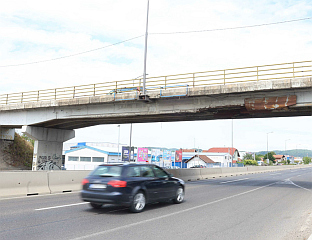
CONSTRUCTION OF A NEW OVERPASS WORTH BAM 530,000 BEGINS IN TRN
BANJA LUKA, JULY 29 /SRNA/ - A new overpass, worth BAM 530,000, will be built on a section of the Banja Luka - Klašnice main road, in the settlement o...

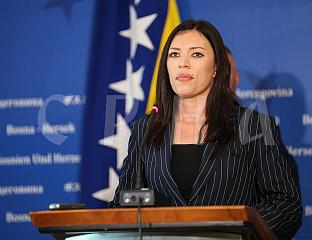
VULIĆ: ĆULUM'S TERM AS SIPA DIRECTOR HAS NEVER ENDED
SARAJEVO, JULY 29 /SRNA/ - The Head of the SNSD Caucus in the House of Representatives of the BiH Parliamentary Assembly, Sanja Vulić, stated today th...

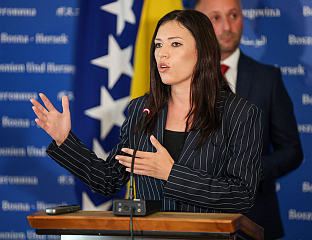
VULIĆ: SIPA CANNOT OPERATE ON EMRIĆ'S ORDERS
SARAJEVO, JULY 29 /SRNA/ - The Head of the SNSD Caucus in the House of Representatives of the BiH Parliamentary Assembly, Sanja Vulić, said that the S...





 LATEST NEWS:
LATEST NEWS: